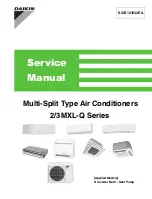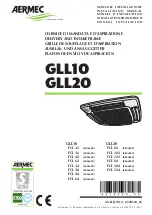
(Mar, 2012)
Compact CWE Series Installation, Operation & Maintenance Manual
Air Technology Systems, Inc.
4.3 Field Service
NOTE
Do not attempt to make repairs without the
proper tools.
It may be necessary to perform repairs on the A/C
system. If fi eld repairs are necessary, the following
procedures apply:
1. All electrical connections should be checked to
ensure they are tight and properly made.
2. Check all circuit breakers, contacts and wiring.
The contactor should be examined and replaced
if contacts are worn or pitted.
4.3.1 General Common Repairs/
Component
Replacement
4.3.1.1 Cooling System
NOTE: Repairs to refrigeration systems must be
performed by a journeyman refrigeration mechanic or
air conditioning technician.
If the Chilled Water system isn’t cooling or if cool-
ing is reduced, check for leaks in the system. Check
for clogged water lines. If fi lters are installed in the
CW lines, check the condition of the fi lters. Clean or
replace the fi lters if necessary.
4.3.1.2 Leaks
A leak in a chilled water cooling system will usually
form a puddle of fl uid beneath the unit that can
be easily seen. Visually trace the leak up from the
puddle to the area on the unit where fl uid may be
seen dripping.
When a leak is detected, properly reclaim the
remaining CW coolant before attempting repairs.
Adjacent piping must be thoroughly cleaned by
removing all paint, dirt and oily fi lm. Use wire brush,
sandcloth or sandpaper and wipe the area with clean,
dry cloths. Protect nearby parts from heat damage
by wrapping with water-soaked cloths.
For copper-to-copper (piping) repairs use SILFOS
Alloy. No fl ux is required with Silfos Alloy. Silver
solder (Stay Silv #45) and fl ux are to be used on
copper-to-brass or copper-to-steel repairs.
When repairs are completed, remove all traces of
fl ux. After any repair, pressurize the system to check
for leaks prior to recharging the system.
4-4
4.3.1.3 Humidifi er Cylinder Replacement
After an extended period of operation, the yellow LED
on the humidifi er cabinet will repeatedly fl ash four
times indicating that the cylinder is completely used
and a replacement cylinder must be installed. The
cylinder is disposable and cylinder life is dependent
on water supply conditions and humidifi er usage.
Refer to the humidifi er operator’s manual supplied
under separate cover for detailed instructions on
changing the cylinder. The following procedures are
to be followed when replacing the cylinder.
CAUTION
Failure to replace the cylinder at the end of
cylinder life may result in humidifi er damage.
NOTE
Decrease the humidity setpoint below ambient
humidity to allow the cylinder to cool down
before removing the cylinder.
1. Turn the A/C unit Off by pressing (and holding)
the Enter key on the E² controller.
2. Turn off the water supply to the humidifi er.
3. Open the door of the A/C unit and turn the main
power disconnect switch on the electric box Off.
Remove the cover from the electric box.
4. Fashion a jumper wire and
install it across the terminals on
the Air Flow Switch (F40).
5. Using a pair of vise grips, turn
the shaft of the main power
switch to the On position to
provide power for the humidifi er
drain solenoid.
6. Drain the cylinder by pushing
the “On-Off-Drain” switch to the
“Drain” position.
7. When drained, push the “On-Off-Drain” switch to
the “Off” position.
8. Remove the jumper wire from the Air Flow switch
and turn the main power disconnect switch Off to
disconnect power from the humidifi er.
9. The power wires to the cylinder are attached by
cylinder plugs to the electrode pins on top of the
cylinder. Pull these plugs vertically off the pins.
CAUTION
The cylinder and steam hose may be hot and
burns may result.












































